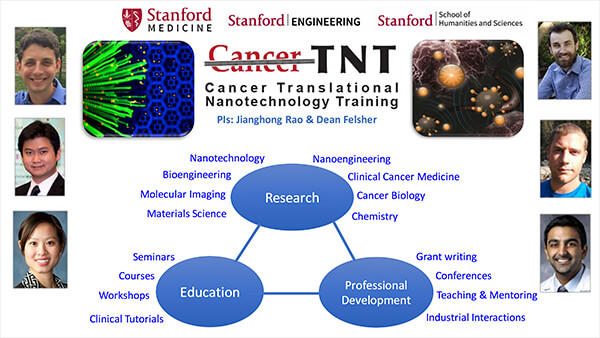Stanford University — Cancer Translational Nanotechnology Training Program
Stanford University
Principal Investigator: Jianghong Rao, Ph.D., and Dean Felsher, M.D., Ph.D.
Training Focus and Objectives
The Stanford Cancer-Translational Nanotechnology Training (Cancer-TNT) Program is a diverse and synergistic 3-year training program bringing together 25 faculty in 9 departments from three schools to train the next generation of interdisciplinary leaders who will pursue challenges in cancer research and clinical translation. During the proposed 5-year cycle, we will recruit a total of 12 postdoctoral trainees to provide them with education and cross-disciplinary training to develop interdisciplinary researchers in cancer nanotechnology translation. Our trainees' skill sets will bridge multiple disciplines such as chemistry, molecular biology, bioengineering, nanoengineering, molecular imaging, and clinical cancer medicine. Trainees will be able to advance cancer research, diagnosis, and management. The 3-year program includes coursework and research with two complementary mentors. The course work will be selected in cancer biology, cancer immunology, molecular imaging, molecular pharmacology, and gene therapy, nanomedicine, micro/nanofabrication, biochips, electrical engineering, and materials science, in consultation with the program director and research advisor. In addition, hands-on training activities in Nanocharacterization and a clinical component including Stanford Oncology Clinical Lecture Series will be offered. In their second year trainees will prepare a mock grant proposal to help them gain experience and confidence in the grant application process. A Training Committee will oversee trainee progress, with an Advisory Committee monitoring the entire program.
